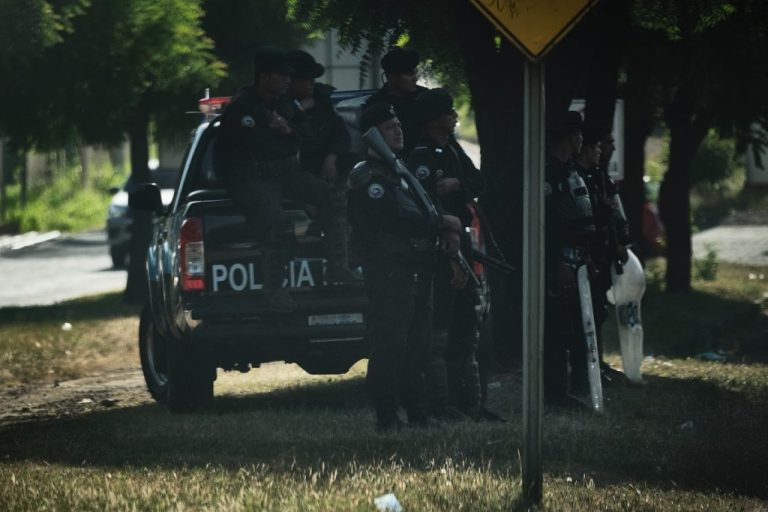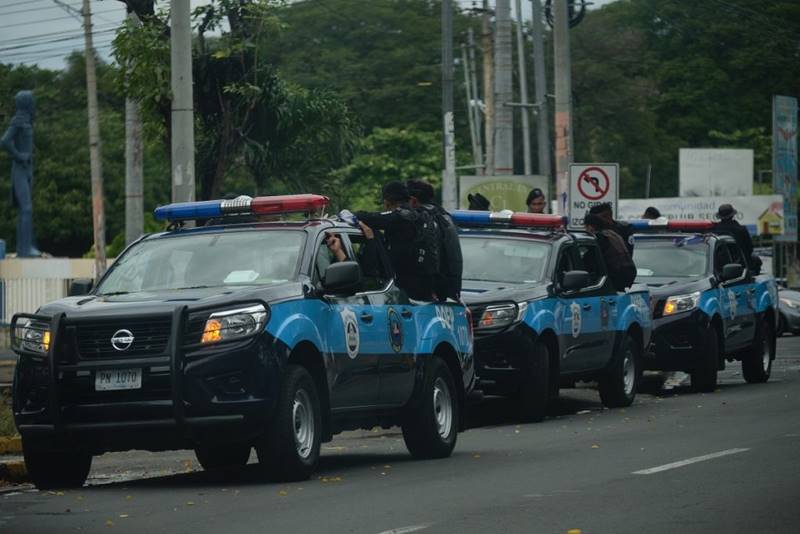13 de septiembre 2019

The Return of the Military

PUBLICIDAD 1M
PUBLICIDAD 4D
PUBLICIDAD 5D
“The pressure should not decrease. We must keep this volcano awake,” says ‘Franco,’ a protestor who does express sit-ins with friends

In an office located in the center of Managua, a group of young people meet to plan another “express sit-in.” Last month these same young people, all college graduates, carried out two successful protest actions, that is, without attacks or police detentions.
“We do it very carefully, because we do not want to lose our jobs or be sent to El Chipote,” (the infamous interrogation prison) explains ‘Franco,’ who with this group continues to “resist” despite the de facto police state imposed by the National Police since September of 2018.
‘Franco’ has participated in protests since April 18 of last year. “We left at five o’clock in the afternoon and with the group we went to “Camino de Oriente.” The rest is history. I mean the death, destruction and aggression that came from the Police and the dictator,” he recalls. This 28-year-old young man, accepted to talk with Confidencial on condition of anonymity, and ensures that he and his group continue to protest because “the pressure should not decrease.” “We must keep this volcano awake,” he says.
To successfully carry out the “express sit-in,” ‘Franco’ and his teammates, will have to draw up a strategy that does not expose them to the riot police. The patrols and the number of agents have increased in the areas where they expect to protest. They have been guarded constantly. “It is our desire to make a homeland. Only in this country you cannot wave your flag because right there they arrest you. It is ridiculous,” criticizes ‘Franco,’ who hurriedly sends some images of the siege that exists around the place where he is meeting with his friends.
Since September 2018, the Police of the dictatorship of Daniel Ortega executes a de facto police state that prevents Nicaraguans from protesting against his regime. To date, seven calls (for marches) from different civil society organizations have been banned. And this week, the Committee for the Release of Political Prisoners has made another request, on which they still await a response.
The Police bans the marches through an order that threatens to arrest and prosecute people and organizations who call for civic demonstrations. “They will be responsible and will respond to justice, the people and organizations that summon these illegal displacements from which they have promoted and are trying to promote illegal, destructive and criminal activities,” warned the press release broadcasted by official media.
The Police not only reject the requests to carry out mobilizations. They also patrol the streets of the capital, and those of different municipalities in the country, to prevent protestors from releasing blue and white balloons or wave the Nicaraguan flag. In Managua, there are permanent patrols of all roundabouts.
The police presence has extended to the surroundings of Centro Pellas, LaFise on Masaya highway, Invercasa, the Central American University (UCA) and the Holiday Inn Hotel, where the Civic Alliance, the Blue and White National Unity, and other civil and political organizations, hold their meetings or press conferences.
In these sites, the Police places approximately 20 officers. In some sites, there is also a parked patrol. In addition, five other pick-up trucks with riot police regularly travel through the sector, which are the same that circulate through different parts of the capital.

Police patrols with riot police guard the entrance to the UNI and UCA universities, in Managua. Photo: Carlos Herrera
In Masaya, Leon, Jinotepe and Matagalpa, police surveillance extends to churches, and the right to assembly is violated.
These officers’ mission is to stifle any attempt at protest. If some citizens throw blue and white balloons, then they catch and burst them. If Nicaraguan flags are placed with the coat of arms upside down, then they have to flip them or simply confiscate them. And if they have the possibility of capturing the “ones that caused such a serious terrorist attack,” they are beaten to “subdue them” and take them to the nearest station or El Chipote in Managua.
“Every time the mothers of the political prisoners want to go out and ask the people for help, to get their support, to help us protest for our kidnapped children, we are grabbed by the Police, by riot police, by all the (repressive) apparatus that this man has, they mistreat us, massacre us, we are trampled upon,” Martha Alvarado says.
The protestor adds that the situation in the country is “incredible” and questions how can we “live in peace” in a country in which you are accused as a terrorist if you make a peaceful mobilization. “I don’t know how we can live in this police state, we have no right to protest, to march,” she says.
Jose Merlo, another citizen who opposes the Ortega regime, said the actions of the police are reprehensible, and that instead of protecting citizens, it intimidates, threatens and beats them.
“I am of the criteria that the people have already made a decision, and nobody can stop it, no matter what they do. They can kill, fill the jails and cemeteries, but the people already made a decision and that is to get rid of this dictatorship,” Merlo stated.
The freedom of mobilization and demonstration is one of the agreements signed at the now suspended Negotiation Table with the Civic Alliance, which was not complied with by the Ortega regime. The police state of siege proves that the dictatorship has no will to comply with what was signed.
Diana Lacayo, housewife and opponent to the regime, believes that Ortega does not intend to comply with the agreements. For this woman, the dictatorship “has no word” and instead seeks to continue oppressing the people until the next elections.
“We mustn’t live in a state of siege. We cannot demonstrate, express ourselves. At any moment they attack us and take us prisoners. It is that this man from the beginning did not want to comply [with agreements the government signed], and now less. I do not believe him,” Lacayo maintains.
In an interview on the program “Esta Semana” (This Week), the representative of the Civic Alliance, Azahalea Solis, agreed that the rights to mobilization and expression remain curtailed, alluding to the prevailing police state in the country. “You have to camouflage yourself to hold meetings…we cannot accept that we have no right to demonstrate,” she assures.
Juan Sebastian Chamorro, also a member of the Civic Alliance, said the fact that Ortega continues with the police harassment, highlights the incongruity of his Government and exposes it to the international community as a political force that does not want a solution to the national crisis.
“We exposed the incongruity of the Government that claims to be democratic, and that supports freedoms, when in fact it does the opposite. They themselves signed the agreement of March 23 and they themselves are violating it, in such a way that this constitutes evidence of the breach of the agreements that are enshrined in the Constitution,” Chamorro explains.
At the end of August, the Civic Alliance presented a proposal of thirteen reforms to the electoral system, which in turn includes five reforms at the constitutional level to advance general, municipal and regional elections, prohibit reelection and establish the second-round runoff system when no candidate obtains 50% of the vote.
The reform proposal is conceived by the opponents as a starting point to establish “a national unity,” at a time when the dictatorship intends to impose its own reform unilaterally. Along with the requirement of electoral reforms and advancement of elections, citizens demand as a condition the suspension of the state of siege.
Student leader Edwin Carcache notes that Ortega maintains the permanent police siege because he fears the unity of the people. He adds that, despite having “everything against,” they will not stop the struggle to achieve freedom in Nicaragua.
“Ortega is envious. Ortega is afraid to see this muscle of the people who want elections as soon as possible. That is what Ortega is afraid of, that is why we have the state of siege we see now. As citizens we are aware of the risks and we will fight to achieve our goals,” Carcache affirms.
On the streets, citizens are also aware of the risk of elections under a police state. “We cannot go to elections with an AK in the neck. Here there is no security for anyone” said Alvarado whose son was kidnapped for protesting..
For these citizens, the solution passes through holding electoral reforms once the other political prisoners who continue in the dungeons of the regime have been released. And it is also essential that there is not a de facto police state and that the electoral process takes place without “this man in power.”
Archivado como:
PUBLICIDAD 3M
Confidencial es un diario digital nicaragüense, de formato multimedia, fundado por Carlos F. Chamorro en junio de 1996. Inició como un semanario impreso y hoy es un medio de referencia regional con información, análisis, entrevistas, perfiles, reportajes e investigaciones sobre Nicaragua, informando desde el exilio por la persecución política de la dictadura de Daniel Ortega y Rosario Murillo.
PUBLICIDAD 3D